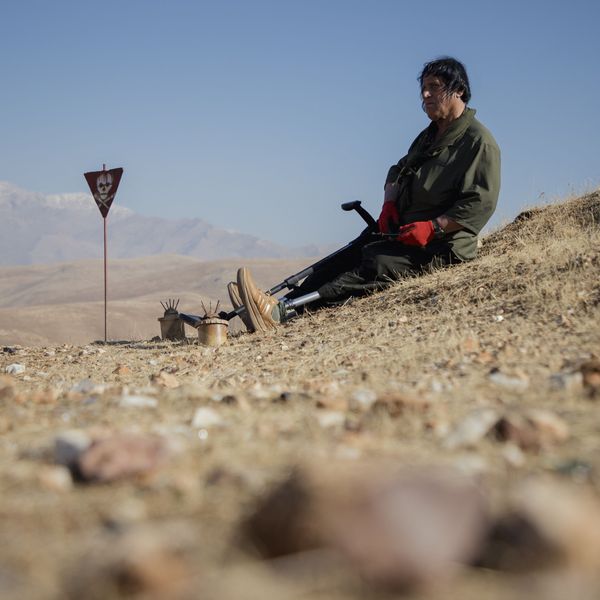Legacy of US Nuclear Weapons Still Killing Uranium Miners Decades Later: Study
Study obtained exclusively by The Guardian exposes deaths of workers who mined uranium for nuclear weapons and power generation
The race by the U.S. and British governments to build nuclear arms and power plants in the 1970s has left behind a deadly--and largely ignored--legacy for those who worked at the world's oldest open-pit uranium mine in Namibia.
Workers who mined uranium ore in Namibia for the British and U.S. military in the Rossing uranium mine during the 1970s are dying of cancers and unexplained illnesses, according to The Guardian, which obtained exclusive access to a study by Earthlife Namibia and the Labor Resource and Research Institute that is slated for release later this week.
The workers dug materials for U.S. and UK nuclear weapons and power plants at the mine, which is located in the Namib desert and still produces 7 percent of the world's uranium.
Workers faced dangerous conditions, poor regulations, and high levels of dust, according to the study. According to The Guardian,
During the first years of operation, Rossing operated with a migrant labor system which the International Commission of Jurists declared illegal and said was similar to slavery. Black workers lived on the mine premises and were exposed to dust and radiation 24 hours a day and the mine became the focus for protests by anti-apartheid and anti-nuclear groups.
Based on a survey of current and former workers at the mine, the study found that every respondent knew people suffering lung infections and other illnesses they believe are linked to conditions at the mine.
"People get sick. We are seeing it in people that have worked for Rossing for a long time. They just go back and die after working at Rossing," one man told researchers.
While the study's authors say conditions at the mine have marginally improved, they find its 1,500 workers are still exposed to high levels of dust.
Yet, the study states, "Uranium companies generally deny that workers get sick because of exposure to radiation. They blame the bad health conditions to unhealthy lifestyles such as eating habits, tobacco smoking and alcohol."
_____________________
An Urgent Message From Our Co-Founder
Dear Common Dreams reader, The U.S. is on a fast track to authoritarianism like nothing I've ever seen. Meanwhile, corporate news outlets are utterly capitulating to Trump, twisting their coverage to avoid drawing his ire while lining up to stuff cash in his pockets. That's why I believe that Common Dreams is doing the best and most consequential reporting that we've ever done. Our small but mighty team is a progressive reporting powerhouse, covering the news every day that the corporate media never will. Our mission has always been simple: To inform. To inspire. And to ignite change for the common good. Now here's the key piece that I want all our readers to understand: None of this would be possible without your financial support. That's not just some fundraising cliche. It's the absolute and literal truth. We don't accept corporate advertising and never will. We don't have a paywall because we don't think people should be blocked from critical news based on their ability to pay. Everything we do is funded by the donations of readers like you. Will you donate now to help power the nonprofit, independent reporting of Common Dreams? Thank you for being a vital member of our community. Together, we can keep independent journalism alive when it’s needed most. - Craig Brown, Co-founder |
The race by the U.S. and British governments to build nuclear arms and power plants in the 1970s has left behind a deadly--and largely ignored--legacy for those who worked at the world's oldest open-pit uranium mine in Namibia.
Workers who mined uranium ore in Namibia for the British and U.S. military in the Rossing uranium mine during the 1970s are dying of cancers and unexplained illnesses, according to The Guardian, which obtained exclusive access to a study by Earthlife Namibia and the Labor Resource and Research Institute that is slated for release later this week.
The workers dug materials for U.S. and UK nuclear weapons and power plants at the mine, which is located in the Namib desert and still produces 7 percent of the world's uranium.
Workers faced dangerous conditions, poor regulations, and high levels of dust, according to the study. According to The Guardian,
During the first years of operation, Rossing operated with a migrant labor system which the International Commission of Jurists declared illegal and said was similar to slavery. Black workers lived on the mine premises and were exposed to dust and radiation 24 hours a day and the mine became the focus for protests by anti-apartheid and anti-nuclear groups.
Based on a survey of current and former workers at the mine, the study found that every respondent knew people suffering lung infections and other illnesses they believe are linked to conditions at the mine.
"People get sick. We are seeing it in people that have worked for Rossing for a long time. They just go back and die after working at Rossing," one man told researchers.
While the study's authors say conditions at the mine have marginally improved, they find its 1,500 workers are still exposed to high levels of dust.
Yet, the study states, "Uranium companies generally deny that workers get sick because of exposure to radiation. They blame the bad health conditions to unhealthy lifestyles such as eating habits, tobacco smoking and alcohol."
_____________________
The race by the U.S. and British governments to build nuclear arms and power plants in the 1970s has left behind a deadly--and largely ignored--legacy for those who worked at the world's oldest open-pit uranium mine in Namibia.
Workers who mined uranium ore in Namibia for the British and U.S. military in the Rossing uranium mine during the 1970s are dying of cancers and unexplained illnesses, according to The Guardian, which obtained exclusive access to a study by Earthlife Namibia and the Labor Resource and Research Institute that is slated for release later this week.
The workers dug materials for U.S. and UK nuclear weapons and power plants at the mine, which is located in the Namib desert and still produces 7 percent of the world's uranium.
Workers faced dangerous conditions, poor regulations, and high levels of dust, according to the study. According to The Guardian,
During the first years of operation, Rossing operated with a migrant labor system which the International Commission of Jurists declared illegal and said was similar to slavery. Black workers lived on the mine premises and were exposed to dust and radiation 24 hours a day and the mine became the focus for protests by anti-apartheid and anti-nuclear groups.
Based on a survey of current and former workers at the mine, the study found that every respondent knew people suffering lung infections and other illnesses they believe are linked to conditions at the mine.
"People get sick. We are seeing it in people that have worked for Rossing for a long time. They just go back and die after working at Rossing," one man told researchers.
While the study's authors say conditions at the mine have marginally improved, they find its 1,500 workers are still exposed to high levels of dust.
Yet, the study states, "Uranium companies generally deny that workers get sick because of exposure to radiation. They blame the bad health conditions to unhealthy lifestyles such as eating habits, tobacco smoking and alcohol."
_____________________

